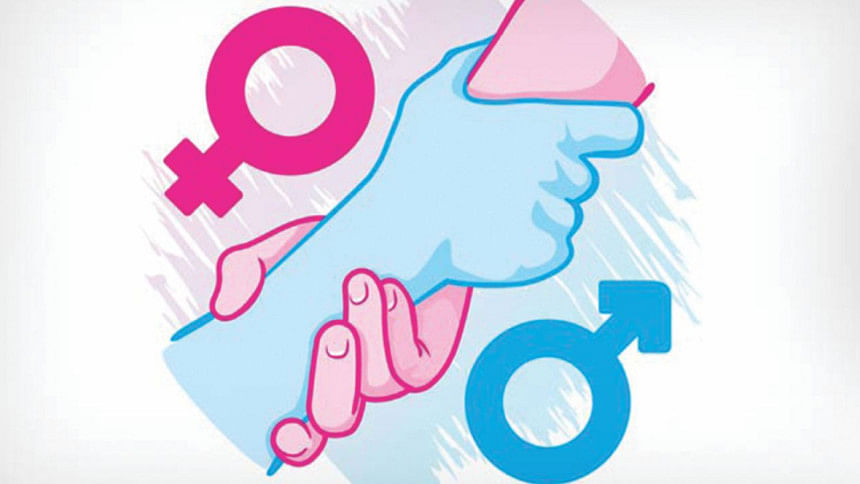Women's Day shenanigans and a reality check

Huge drum rolls and pageantry surrounded the recent celebrations of International Women's Day. We can obviously feel enlightened on this front, having women as the chief executive of the government and that of the parliament. But are we really any different than we were 50 years ago or any different from contemporary Asian countries when it comes to women's empowerment? Statistics of women in power give a very stark picture—out of 77 secretary level officers only 10 are women, out of 300 non-quota members of parliament only 22 are women. There are few or no women serving in the higher ranks in the armed forces, no woman CEOs of banks. These point to pretty much a male-dominated power structure at the top. Of course, some of the affirmative action measures being taken by the nation are commendable such as having 50 reserved seats for women in the parliament, appointing of 9 women DCs (district administrators) out of 64 and generally reserving 10 percent quota for women officers in the civil service. However, the measly quotas are a clear indication that gender parity is still a long way off.
Compared to 50 years ago, the needle of women empowerment has moved ever so slightly for the top echelons of power. However, women's empowerment at the bottom has certainly come a long way—there is gender parity in primary and secondary school enrolments and nearly a third of our organised or formal manufacturing sector workforce are female. It is only a matter of time before many of these women move up through the ranks in society and occupy positions of power. But if we leave it to society alone then social mobility and gender percolation will be fraught with obstacles and gaping holes as ostensibly demonstrated by the attacks on women at the March 7 rally or the alarming rise in sexual violence.
Such a pervasive culture of male chauvinism is not going to go away through institutional education alone. In fact, gender parity even at the tertiary level does not automatically guarantee women's empowerment and liberty. One only has to take a look at the standard bearer of the West—the biggest economy and the mightiest nation on Earth, i.e., the USA—to see the fallacy in such an argument. The so called "land of the free" has elevated a man to their highest seat of power who openly objectifies and denigrates women.
In our country chauvinism runs deep in our social psyche from the elites of society to the poorest of the poor. Two anecdotes come to mind that illustrate this. Some years ago a friend of mine went to WVA (a national women's organisation) to pick up his mother. He went into the hall where a general meeting was in progress and nonchalantly looked for his mother. As he approached her one of the WVA officers accosted him out of the meeting and told him in no uncertain terms that he had no business to intrude into the meeting. That's when it hit my friend that despite his high level of education and generally progressive outlook on life he sub-consciously gave little importance to a women's formal gathering. The other anecdote relates to the story of a homeless family in Mohammadpur opposite Gonobhaban—the official residence of the prime minister. The family comprised of a young man in his early twenties and two older women, presumably the young man's elder sister and mother. It was apparent that they were making their way through life by begging on the streets. It was mid-day and one of the women was serving lunch for the family on the pavement. All of a sudden the young man was seen kicking the lunch plates. What was the fault of the woman? She did not serve him lunch first! There was no word of protest from the women even though their hard-earned lunch was gone. Such pervasive male-chauvinism did not permeate all strata of society in a day nor will it be possible to eradicate this scourge overnight.
Naturally the question is how do we overcome this social malaise and who do we look up to as role models? The answer most likely lies in how we are raising our children and teaching them to take their position at the dinner table equally. For cultural guidance we only need to look at the Moors of Spain—a 9th–15th century Muslim civilisation that was at the peak of knowledge and economic development at the time, where men and women studied side by side at its universities and other institutions of learning and contributed equally to societal progress.
We must inculcate in our children that men and women are equally ordained as pinnacles of natural evolution and they must recognise their mutually fulfilling roles in the universe as men and women. We must teach them that merits and achievements speak for themselves and no man or woman has a monopoly on human greatness. Such teachings need to be apparent in everything we do on a day-to-day basis and also reflected in affirmative actions at public and private workplaces. And then gradually we shall overcome the long-held gender biases for a truly meritocratic society dreamed of by the iconic women's rights advocate Begum Rokeya Sakhawat Hossain.
Habibullah N Karim is an author, policy activist, investor and serial entrepreneur. He is a founder and former president of BASIS and founder/CEO of Technohaven Company Ltd.
Email: [email protected]





Comments